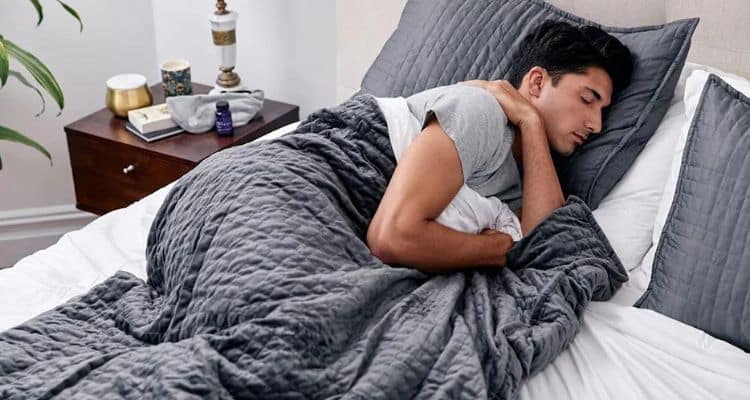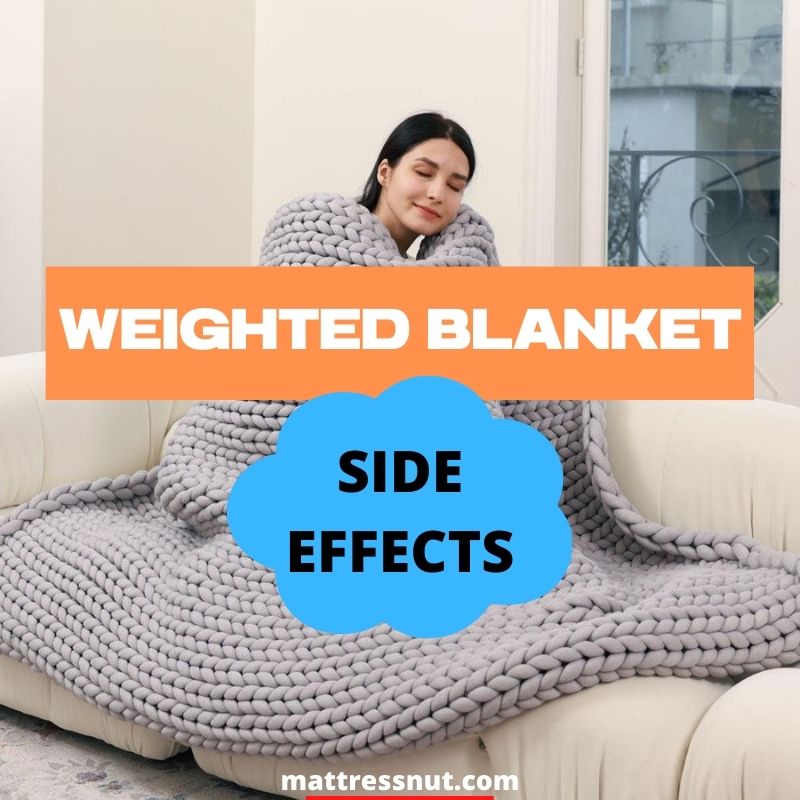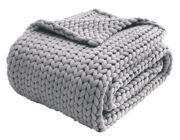We know that there is no magic pill to relieve stress and anxiety. It only leads to a chaotic life and a lack of deep sleep, which affects every aspect of our lives. You can either run from it or deal with it; the best option is a weighted blanket.
Why? We’ll tell you why!
Weighted blankets are the most natural way to make every night peaceful and worthy. An uncompromised way to help calm your body for better deep sleep. It won’t just help you sleep better; it’ll help you live better. Weighted blankets have some weight to them, which soothes you or distressed and anxious patients to sleep (check the top-rated weighted blankets for anxiety).
Let us look further into the credibility of a weighted blanket as to what makes them great.
Best Weighted Blanket Reviewed
A weighted blanket designed to provide absolute comfort, and the chunky style makes it more tempting
Sleep is essential, but deep sleep is a blessing. So many factors around us disrupt a good night’s sleep, and eventually, you give up on your hopes of ever having one. Weighted blankets are a good option for experiencing the coziest sleeping environment.
The Grey Chunky Weighted Blanket by Zonli gives you the ultimate comfort you had never imagined. They have managed to take weighted blankets a step further with exclusive design. This blanket appears elegant and hand-knitted, giving a bold, distinct, and stylish look.
The filling dumps the traditional beads and incorporates twisted polyester yarn. This guarantees no filling displacement, and the weight is evenly distributed. The acrylic knitted shell fabric does not shed or pill even after regular use.
The hand-knit pattern ensures proper ventilation, so you don’t feel suffocated under it. No matter how you use it, the blanket maintains a moderate temperature, letting body heat escape and cool airflow (also check 7 amazing cooling weighted blankets for summer). This is beneficial when it comes to maintaining the blanket. The flow of the air keeps the blanket crisp and clear of all molds and mildew.
The Zone Chunky Weighted Blanket is in four sizes with three different weights. Overall they are made of just fabric making them highly sustainable. You can choose from their exclusive variety of weighted blankets. These include the ones with Premium Cotton filling and Bamboo filling weighted blankets.
How Do Weighted Blankets Work?
Weighted blankets provide deep-pressure stimulation therapy. This lets you experience a calming and relaxing effect on the body.

Weighted blankets contain small, evenly distributed material that adds weight to them. It can be plastic pellets, glass beads, polyester, or rice. It varies from brand to brand or is custom-made to attend to a specific liking. The weights are sewn or filled into the blanket, breathable and soft fabric.
When using a weighted blanket, choosing a size and weight appropriate for your body is essential. The blanket should be broad enough to cover the entire body but small enough not to hang down the bed. The correct weight distribution is all that matters. It is vital to ensure the blanket is not too heavy for the user, as this could cause discomfort.
Overall, weighted blankets are used as therapy for people with autism, attention deficit hyperactivity disorder, restless leg syndrome or other anxiety conditions (check the best selling weighted blankets for restless legs). These syndromes benefit from the deep-pressure stimulation that the weighted blankets provide. However, anyone can use a weighted blanket to promote relaxation and reduce stress.
Can Weighted Blankets Cause Body Pain?
For many, weighted blankets help relieve their body pain, while others think otherwise. A weighted blanket will be quite soothing if stress and hard labor cause your body aches.
But sometimes, consistent use or uneven weight can become the likely cause of the pain. Even a too-heavy blanket might be the culprit for exceeding body pain. It’s crucial to analyze what weight of the blanket best suits you carefully. If weighted blankets cause pain, you can use a lighter blanket without the weight.
How Can You Sleep On Your Side With A Weighted Blanket?
A weighted one works just as fabulous for a side sleeper as for the back. However, an essential factor to consider is to go for a lighter-weight blanket. You can get one with 10% of your body weight, but a lighter than will work better. Since you will be changing sides once in a while in the blanket, it should be effortless.
Who Should Not Use Weighted Blankets?
Diabetes
Diabetes patients have circulatory issues. Their feet are at the most risk because low blood flow can lead to necrosis. A weighted blanket swaddles its sleeper, restricting movement to some extent. It is appreciated by many, but for diabetic patients, the lack of movement can be harmful. It further slows their blood flow, causing irreversible health issues.
Sleep Apnea, Asthma & Patients with Difficulty In Breathing
Weighted blankets impede or somewhat slow down breathing. This may not work in favor of those suffering from respiratory disorders. If you have sleep apnea, you might want to avoid using a weighted blanket as it could make it harder for you to breathe. If you have a chronic respiratory disease like asthma, using a weighted blanket is generally not a good idea.
Blood Circulatory and Pressure Issues
The weight achieves the cuddling effect of the weighted blanket it puts on your body. This reduces pulse rate, blood pressure, and overall blood circulation. Reasonable enough that someone with blood pressure or circulatory should avoid weighted blankets.
Skin Sensitivity, Chronic or Acute Rash & Wounds
Weighted blankets create pressure, producing heat, moisture, and warmth under the blanket. These attributes do not go in support of those with skin issues. A rash may worsen, and an open wound will not heal as it won’t get the oxygenation to dry out. Anyone with fragile skin will suffer worse consequences under the weighted blanket.
Claustrophobia
The added weight of the blanket can make it feel like you’re being suffocated or trapped. This can trigger anxiety and make Claustrophobia worse. The weight of the blanket can make it challenging to move around, which can be claustrophobia-inducing. ·
Cleithrophobia
Weighted blankets may not be ideal for people with cleithrophobia. It is the fear of being enclosed in small spaces. The heaviness of the blanket can make it feel like one is trapped, which can trigger anxiety. The pressure of the blanket can be overwhelming and heavy, leading to panic attacks. Finally, weighted blankets are often quite warm, which can be another trigger for people with Cleithrophobia.
Cons of Weighted Blankets
Needs Time to Get Accustomed To
Introducing a weighted blanket into your routine might be more complex. It is a whole new aspect and change of conditions. Only used regularly, it may take some time to adjust to the blanket. However, once you realize the benefits of it, then things become comfortable.
Expensive
Weighted blankets are not your regular grab-and-go element. They are either recommended by doctors or bought to counter some sleeping disorders. Weighted blankets have a complex manufacturing procedure. The material has to be long-lasting, with durable covers and inner layers. The weights added should be enduring and toxic-free. Even sewing, knitting, and manual labor are of high quality. All the added construction practices make this blanket more expensive than the regular one.
Not Recommended for Babies and Toddlers
There have been reports of babies ad infants suffocating under the weight of the blanket. It is simple logic that babies cannot have excess weight upon them as it will become life-threatening.
Not Accessible for Traveling
The size and the overall weight does not make weighted blankets accessible. Even the most standard-size one weighs around 15 lbs, requiring more space. It is challenging to fold, pack and carry it around because of its weight, design, and surface area. A regular blanket might be more favorable in traveling situations.
Not Recommended For People with Sleep Apnea & Other Sleep/Respiratory Diseases
Weighted blankets reduce your breathing and overall pulse oximetry. This means that diseases that involve respiratory concerns should avoid using weighted blankets. The weight and pressure on the body can result in drastic consequences.
People with sleep apnea have brief episodes where they stop breathing. Sleeping under a weighted blanket completely removes them from the surrounding air. This can result in suffocation and death.
What Happens If You Sleep With A Weighted Blanket That Is Too Heavy?
If you sleep with a weighted blanket that is too heavy, you may find it challenging to move around. Usually, a compatible blanket weight is 10% of your body weight. If you go for anything greater than that, then make sure your physician has recommended it.

Eventually, sleeping under a too-heavy blanket might make your sleep worse. You may feel trapped or suffocated by the weight of the blanket. It sometimes makes you feel burdened under the weight, as if caught or cornered. The blanket may be the wrong weight if you experience any of these symptoms; switch to a lighter-weight blanket or a regular one.
How Long Will It Take For A Weighted Blanket To Work?
Weighted blankets work by providing deep-pressure therapy or pressure therapy. This remedial treatment is effective in reducing anxiety and promoting relaxation. The pressure from the blanket helps stimulate the release of serotonin.
Serotonin is a neurotransmitter that promotes a feeling of security and calmness. Some people sleep better and feel more relaxed after using a weighted blanket. The ones who suffer from anxiety switch from fear mode to feeling safer. However, how long it takes one to work varies.
Everyone experiences anxiety and relaxation differently depending on age, size, and routine. Hence the response time and adjustments will differ from person to person. Give the blanket a few weeks to see if it makes a difference. If you do not notice any betterment after a few weeks, it is unlikely that the blanket will be effective for you.
How Long Should You Stay Under A Weighted Blanket?
The time you spend sleeping under the weighted blanket depends on your requirements. If it is for a particular therapy purpose, then go with the doctor’s advice. If you have opted to sleep under one, continue as long as you are comfortable.
Some people may find that they only need to use a weighted blanket for a short time, while others may need to use it for more extended periods. Ultimately, determine your comfort level and requirement to stay under a weighted blanket.
How Do You Know If A Weighted Blanket Is Too Heavy For You?
Consider a few things when determining if a weighted blanket is too heavy for you:
- Consider the weight of the blanket itself. If the blanket is too heavy for you to lift, then it’s too heavy for you to use.
- Consider your body weight. A blanket heavier than 10% of your body weight may be too much for you if you are an average size.
- Prioritize your comfort.
If the weighted blanket is too heavy or uncomfortable, it’s probably not the right weight for you.
Why Do I Sleep So Well With A Weighted Blanket?
There is no doubt that weighted blankets are great for sleeping. One reason is that they provide a gentle, constant pressure that can help to increase relaxation and reduce anxiety. This can lead to less tossing and turning at night and more profound and comfortable sleep.
Weighted blankets can aid in relieving chronic pain as well. They provide gentle yet consistent pressure on the body that calms the nerves. This can lead to less discomfort and a better night’s sleep. Finally, weighted blankets can help to regulate body temperature, especially during the winter. This is a significant factor that can improve sleep quality.
Are weighted Blankets Safe?
Weighted blankets are recommended by doctors who suffer from sleep deprivation for various mental health problem. However, it is only sometimes a pleasure for everyone because what seems comfortable for one may be a pain for others. Weighted blankets have their share of side effects, so it is better to consult a doctor before introducing yourself to one.
Key Takeaways: Unveiling the Side Effects of Weighted Blankets
Potential Causes of Body Pain
Despite being a remedy for many, weighted blankets can sometimes exacerbate body pain, especially if misused or if the weight isn’t appropriately chosen. An excessively heavy blanket or uneven weight distribution can lead to discomfort or even increased body aches.
Concerns for Diabetic Individuals
The restricted movement under a weighted blanket can pose a problem for individuals with diabetes, who often face circulatory issues. The further reduction in blood flow, particularly to the extremities, might lead to exacerbated health complications.
Respiratory Disorders and Weighted Blankets
Individuals with sleep apnea or asthma may find it harder to breathe under the weight of these blankets. The added weight can potentially impede breathing, making it an unfavorable choice for those with underlying respiratory conditions.
Triggering Phobias
People with Claustrophobia or Cleithrophobia may find the pressure of weighted blankets overwhelming. The feeling of being trapped or enclosed could trigger anxiety or panic attacks, making weighted blankets a less suitable option for these individuals.
Exacerbation of Skin Conditions
The pressure and warmth created by weighted blankets can worsen skin conditions, irritate sensitive skin, or delay the healing of open wounds. The moisture and heat trapped under the blanket might not be ideal for individuals with chronic skin issues.
Economic and Practical Disadvantages
Weighted blankets are often more expensive due to their complex construction and high-quality materials. They also pose practical challenges such as being less portable for travel due to their weight and size, and not being suitable for babies, toddlers, or individuals with certain medical conditions.
Choice of Weight Matters
Choosing a blanket that’s too heavy can lead to feelings of entrapment or suffocation, highlighting the importance of selecting a weight that’s around 10% of the user’s body weight, unless otherwise recommended by a healthcare professional.
Time to Acclimate
It may take some time for individuals to adjust to the sensation and weight of these blankets. The initial unfamiliarity may require a period of acclimation before the benefits of better sleep and reduced anxiety are realized.
The Serene Sleep Connection
Weighted blankets promote the release of serotonin, which fosters a sense of calm and security. Their deep pressure stimulation can lead to less anxiety, less tossing and turning, and ultimately, better sleep quality.
Individualized Experience
The effectiveness and comfort of weighted blankets vary from person to person. While some may find relief from insomnia, anxiety, or chronic pain, others may find them uncomfortable or even exacerbate existing health issues. Consulting with a healthcare provider before using a weighted blanket, especially for individuals with underlying health conditions, is highly advisable.
References:
https://www.nasmhpd.org/sites/default/files/V_2_B_ChampaignWeightedBlanket.pdf
https://pubmed.ncbi.nlm.nih.gov/34184958/
https://psychcentral.com/adhd/weighted-blanket-adhd


